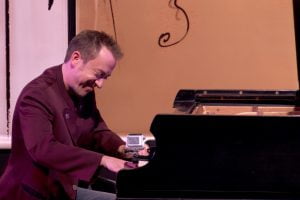Jazz Interview with jazz pianist Geoffrey Keezer. interview by email in writing.
JazzBluesNews.Space: – First let’s start with where you grew up, and what got you interested in music?
GK: – I grew up in Eau Claire, Wisconsin, USA, a small college town in the northern United States. My mother and father were both music teachers.
JBN.S: – What interested you in picking up the piano?
GK: – I started out on drums, because my father is a drummer. As a kid I liked to compose my own music, so the piano was the most natural tool for me for composition, and I just kind of migrated to the piano eventually as my main instrument.
JBN.S: – What teacher or teachers helped you progress to the piano you are today?
GK: – I had several teachers, both jazz and classical, who I learned a lot from. Besides that, I listened to a ton of recordings and tried to copy them.
JBN.S: – What about the Your sound did that influence at all? What did you do to find and develop your sound?
GK: – My piano style is an amalgamation of all the great jazz pianists I listened to and copied, plus great horn players, singers, etc, as well as the great classical composers. I try to sound like myself, but I owe everything to the masters that came before me.
JBN.S: – What practice routine or exercise have you developed to maintain and improve your current musical ability especially pertaining to rhythm?
GK: – Mainly I just try to listen to the drums in whatever band I’m in. I still remember some of the drum patters I practiced when I was playing drums, and now I translate those rhythms onto the piano keyboard.
JBN.S: – Many aspiring musicians are always looking for advice when navigating thru the music business. Is there any piece of advice you can offer to aspiring students or even your peers that you believe will help them succeed and stay positive in this business?
GK: – Because technology and the music business are changing so rapidly in terms of how audiences can access music, as well as how musicians get paid (or not), the only thing that will give you longevity in your career is true hard work and real talent. People can be an overnight sensation on Youtube, but where are they next year, or 10 years from now, or 50 years from now? There’s no substitute for putting in the real hard work, practicing, learning your craft and being the very best musician you can be. Always try to remember why you wanted to be a musician in the first place – what made you love jazz, your instrument? Musical excellence provides a transcendent, spiritual experience for the listener as well as for the musician, and that is what sustains us even through difficult times in the music business.
JBN.S: – How can we get young people interested in jazz when most of the standard tunes are from half-a-century ago?
GK: – Jazz has to evolve for it to survive and be relevant to our society now. The standard tunes will always be there, they’re like Beethoven’s 5th. They’re important to learn as part of the canon and history of jazz. But jazz, whatever that word means now, has to be a creative human expression by people living now, in this time, and that music includes all of the things that are happening now.
JBN.S: – John Coltrane said that music was his spirit. How do you understand the spirit and the meaning of life?
GK: – Those are very deep questions – I can’t say I understand anything at all about the meaning of life. But I love the uplifting feeling that comes from making really good music and connecting with an audience. Beyond that, I’m just trying to earn a living like everyone else, and I’m very grateful that I’ve been able to do it by doing something I love.
JBN.S: – What are your hopes and fears for the future of?
GK: – Well, I’m living from one paycheck to the next, so I’m always afraid there won’t be gigs. That’s why I keep practicing and learning as much music as I can, so I can keep working.
JBN.S: – What’s the next musical frontier for you?
GK: – I have a new record we just recorded, half of it trio and half quartet with a great vocalist named Gillian Margot. I’m excited to share this new music with the world and get out on the road and tour!
JBN.S: – Are there any similarities between the blues/jazz and the genres of local folk music and traditional forms?
GK: – I would say the blues IS the folk music and traditional music form of America. It’s where everything comes from.
JBN.S: – Who do you find yourself listening to these days?
GK: – Anything and everything I can. I love all kinds of music!
Conversation led: Simon Sargsyan







More Stories
Interview with Janis Siegel of The Manhattan Transfer: Jazz, being a more refined, interpreted form of music
CD review: George Benson – Dreams Do Come True: When George Benson Meets Robert Farnon – 2024: Video, CD cover
The band was tight as ever. The Warren Haynes Band cuts loose: Video, Photos